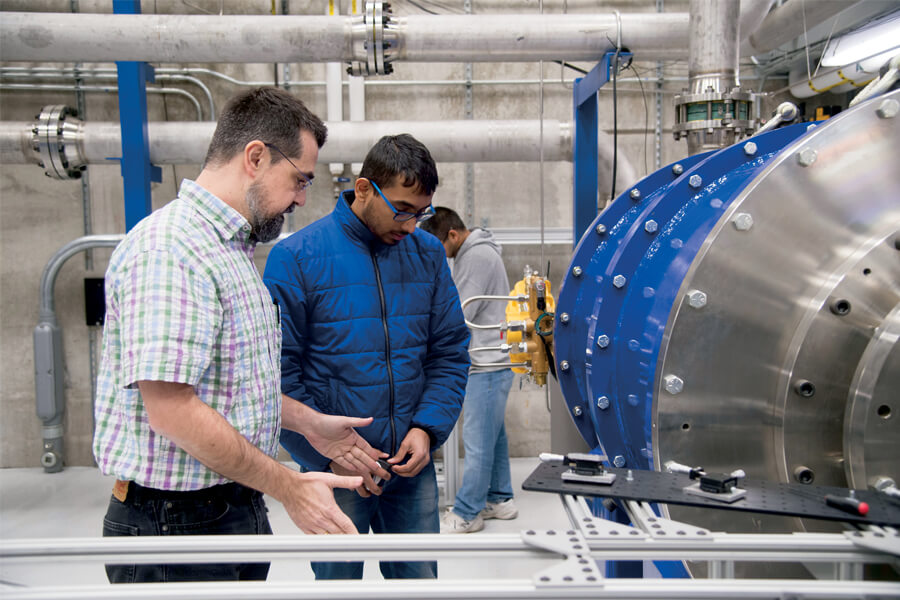Zucrow Labs Adds New Buildings
| Magazine Section: | Strategic Growth Initiative |
|---|---|
| College or School: | CoE |
| Article Type: | Article |
This new building features four 500-squarefoot test cells, a 1,000-square-foot test cell, a 2,100-square-foot laser laboratory, spaces for mechanical fabrication and electronics fabrication, and three control rooms for remote operation of experiments. It also provides the space and infrastructure needed for state-of-the-art research in gas turbine combustion for the next 20 or 30 years.
The office space in the old High Pressure Laboratory was renovated and a new, modern conference room was added.
The Tebbe TDI Laser Lab, a 2,000-square-foot climate-controlled facility within ZL8, runs adjacent to five brand new test cells, for optimal inclusion of laser diagnostic measurements in the experiments. Four of the test cells house air-breathing combustion and sprays experiments, while the fifth test cell houses a state-of-the-art turbine lab for studying aerodynamics and heat transfer in advanced turbine systems. The adjacent air heater has capacity to deliver 1,500°F high pressure air to experiments permitting the researchers to simulate compressor discharge exit conditions for some of the most modern high-pressure ratio gas turbine engines.
All cells are 20 feet high to include all the necessary instrumentation and data acquisition. They also are connected to the new air heater, capable of delivering 1,500°F air at 850 psi.

Zucrow Labs consists of six buildings housing twenty-two individual laboratories, a computer lab with two server clusters on site, a professional machine shop, and air compressors and air tanks capable of delivering 3,300 cubic feet of air at 2,200 psi. Associated with eight of the 22 individual labs are a total of 18 “hazard” test cells and four “high hazard” test cells.
The construction of this building is a testament to the foresight and leadership of Stephen Heister, Raisbeck Engineering Distinguished Professor for Engineering and Technology Integration, who was the director of Zucrow Labs from 2011 to 2016.
Rolls-Royce, Purdue University, and the state of Indiana announced a new $24 million public-private partnership to develop and test next-generation turbine airfoils. The research will be housed at Guillermo Paniagua’s lab, the Purdue Experimental Turbine Aerothermal Laboratory (PETAL), in the new ZL8 building. This program provides Purdue with the nation’s most advanced turbine lab for compact gas turbine engines.
Zucrow also hosts research in rotating detonation engines, thanks to grants from the Department of Energy and the Air Force Office of Scientific Research. About 10 students and staff support this work, developing a high-pressure combustor infrastructure and conducting hundreds of tests at thrust levels exceeding 1,000 lbf and chamber pressures exceeding 400 psi. The DOE aspect focuses on stationary power generation, with large scale, hot-fire tests being partially supported by American rocket and missile propulsion manufacturer Aerojet Rocketdyne.